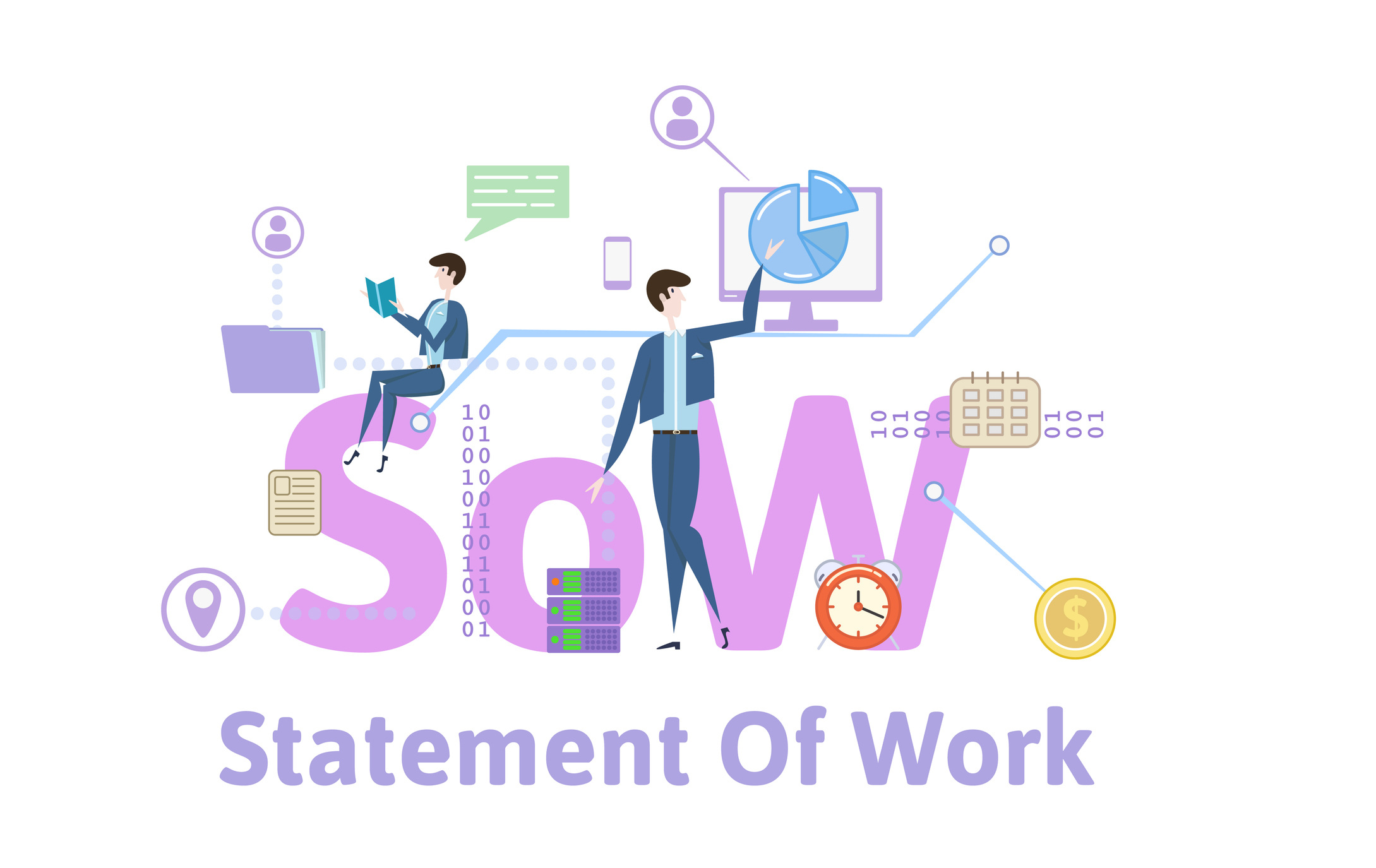How Using A SOW (Statement Of Work) For Staffing Solutions Can Benefit Companies
Streamline your staffing process and maximize efficiency with a well-crafted Statement of Work (SOW).

Discover how the Statement of Work (SOW) can revolutionize your staffing strategy, enhance profitability, and uncover substantial project opportunities.
Statement of Work (SOW) is a comprehensive formal document that meticulously outlines the specific deliverables, timelines, and expectations associated with a particular project. It acts as a critical tool in the staffing industry, where it is employed to provide a detailed account of the roles and responsibilities of both the staffing agency and the client. By doing so, it ensures that both parties have a crystal-clear understanding of the project's scope, objectives, and desired outcomes. This mutual understanding is essential for the smooth execution of the project, reducing the likelihood of miscommunications or misunderstandings that could derail progress.
A SOW is instrumental in mitigating risks by establishing a well-defined and structured framework that clearly delineates the project's parameters. These parameters encompass all aspects of the project, including the specific tasks to be performed, the necessary resources required for each phase, and the criteria that will be used to measure success. Having this level of detail and clarity spelled out in advance is crucial not only for preventing potential disputes but also for maintaining a productive and harmonious working relationship between the staffing agency and the client. It ensures that both parties remain aligned in their expectations and objectives, thereby fostering collaboration and trust throughout the project's duration.
While Statements of Work (SOWs) are predominantly utilized within Managed Service Providers (MSPs) in the staffing industry, their advantages are not restricted to these conventional frameworks. The versatility of staffing SOW allows companies to effectively manage a diverse range of freelance or contract workers, ensuring that all involved parties, from project managers to individual contributors, are perfectly aligned on the intricacies of project goals and the specific deliverables expected at each stage. This alignment is crucial for maintaining project coherence and ensuring that expectations are met without any discrepancies.
By capitalizing on the adaptability of SOWs in various contexts, businesses can significantly streamline their operations. This streamlining process not only simplifies workflows by establishing predefined structures and protocols but also enhances accountability across all levels of a project. Such clarity and precision in outlining roles and responsibilities naturally lead to improved project outcomes, as each team member understands their contribution to the overarching objectives.
Moreover, this strategic approach provides businesses with greater flexibility and control over their staffing resources. In industries that are characterized by rapid shifts and dynamic changes, the ability to quickly adapt and reorganize resources is invaluable. SOWs provide a framework that supports this agility, enabling companies to scale their workforce up or down as needed, respond swiftly to market demands, and seize new opportunities without the typical bottlenecks associated with traditional staffing methods. This adaptability ensures that businesses remain competitive and can efficiently navigate the challenges of ever-changing industry landscapes.
Implementing Statements of Work (SOWs) in your staffing strategy can significantly improve profit margins by offering a more structured and transparent approach to project management. By meticulously outlining and clearly defining the scope of work and expectations from the outset, SOWs play a crucial role in preventing scope creep, which is the gradual expansion of project boundaries without corresponding adjustments to time, cost, or resources. Scope creep can lead to unanticipated costs and efforts, potentially derailing project profitability. By establishing these parameters upfront, SOWs reduce the likelihood of misunderstandings or disputes between stakeholders, which can be both time-consuming and expensive to resolve.
Furthermore, SOWs facilitate more accurate budgeting and resource allocation, two critical components in the successful completion of projects. By detailing every aspect of the project, from the specific tasks to be accomplished to the resources required at each phase, SOWs ensure that projects are executed with maximum efficiency and within the set financial constraints. This precise planning allows for the optimal use of resources, minimizing wastage and ensuring that all efforts are directed toward achieving the project's objectives. As a result, projects are more likely to be completed on time and within budget, which not only enhances the overall efficiency of operations but also leads to increased client satisfaction.
Satisfied clients are more likely to return for future projects, leading to repeat business and a steady revenue stream. This ongoing relationship with clients not only strengthens the agency's reputation in the market but also contributes to a more predictable and sustainable business model. Moreover, the trust and reliability established through consistent delivery can open doors to new business opportunities and referrals, further enhancing profitability. By implementing SOWs effectively, your staffing strategy not only becomes a tool for ensuring project success but also a powerful mechanism for driving growth and long-term financial health.
Statements of Work (SOWs) serve as an exceptionally powerful tool in the identification and management of high volume projects. By meticulously detailing the specific requirements, deliverables, and all associated tasks, SOWs provide a comprehensive and clear roadmap for effectively scaling up staffing efforts to meet the demands of large-scale staffing projects. This level of detail ensures that every aspect of the project is covered, from the initial stages of planning to the final delivery, leaving no room for ambiguity.
The structured approach that SOWs offer enables staffing agencies to make informed decisions regarding the allocation of resources, ensuring that the right personnel with the appropriate skills are assigned to the right tasks at the right time. This careful planning not only helps in managing timelines more efficiently but also enhances quality control measures. By having a detailed plan in place, agencies can anticipate potential challenges and proactively implement solutions to mitigate risks, ensuring that the project stays on track and meets the desired standards.
Furthermore, the clarity and precision provided by SOWs instill a sense of confidence in staffing agencies, allowing them to take on larger, more lucrative contracts with assurance. This confidence stems from the knowledge that every aspect of the project has been thoroughly planned and accounted for, reducing the likelihood of unforeseen issues and ensuring a seamless execution. The ability to efficiently handle high volume projects not only boosts the agency's reputation but also opens up opportunities for growth and expansion in the competitive market. By leveraging the strategic advantages of SOWs, agencies can position themselves as reliable partners capable of delivering excellence on a grand scale.
One key advantage of using Statements of Work (SOWs) in the staffing industry is that they frequently originate from diverse budgetary categories compared to traditional staffing allocations. This distinction can provide a significant strategic financial advantage, as it allows staffing agencies to tap into additional pools of funds and resources that might not be accessible through conventional staffing budgets. These alternative budget sources can include project-specific funds or capital earmarked for contractual work, which can be more flexible and abundant than the restrictive budgets typically allocated for permanent staffing.
By leveraging these alternative financial reservoirs, staffing agencies are equipped to broaden their service offerings significantly. This capacity enables them to take on a more extensive array of projects, ranging from niche market endeavors to large-scale, complex assignments that demand unique skill sets and innovative solutions. Such expansion in service offerings not only positions these agencies as versatile and adaptive in a competitive market but also enhances their overall market position.
Moreover, the ability to tap into these varied budget sources amplifies the agency's revenue potential. It opens up opportunities to engage with a wider client base and diversify their project portfolio, ultimately leading to increased profitability and sustainability. This strategic financial maneuvering ensures that staffing agencies remain agile, competitive, and poised for growth, allowing them to navigate financial constraints with ease and capitalize on emerging business opportunities.
To effectively integrate Statements of Work (SOWs) into your staffing strategy, begin by developing comprehensive and meticulously detailed documents that encapsulate every facet of the project. This includes specifying timelines, which not only define the start and end dates but also break down the project into phases with individual milestones. Additionally, clearly outline the deliverables, ensuring they are quantifiable and align with the project's overall objectives. Responsibilities should be assigned with precision, delineating the roles of each team member and stakeholder, and specifying the resources they will require to fulfill their tasks efficiently. It's crucial that all stakeholders, including clients, project managers, team members, and any external partners, have a thorough understanding of the SOW. This understanding ensures that everyone involved is on the same page and committed to adhering to the SOW's guidelines and stipulations, thereby fostering a cohesive and collaborative effort.
Regularly reviewing and updating SOWs is essential to reflect any changes in project scope or requirements that may arise during the project's lifecycle. This practice involves conducting periodic assessments and evaluations to identify any shifts in the project's needs or objectives, and making the necessary adjustments to the SOW. Maintaining open lines of communication with clients and team members is equally important, as it promotes transparency and allows for the timely resolution of any issues or concerns. By following these best practices, you can not only maximize the benefits of SOWs but also enhance project management efficiency. This strategic approach drives better project outcomes by ensuring alignment, reducing the risk of misunderstandings, and ultimately contributing to the successful completion of projects that meet or exceed expectations.

Streamline your staffing process and maximize efficiency with a well-crafted Statement of Work (SOW).

Explore how mid-market SOW software can transform project management for staffing agencies and MSPs, driving efficiency, profitability, and growth.

Unlock the potential of your staffing strategy by understanding the intricacies of Statement of Work (SOW) in staffing.